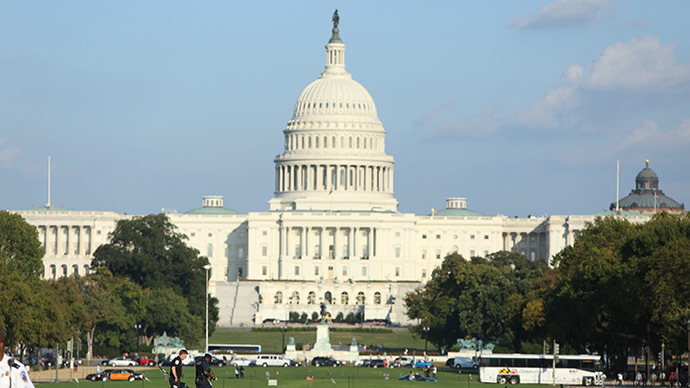'ISIS! 9/11!' NSA reform bill killed in US Senate over terror fears

The US Senate failed to get the 60 votes needed to break a filibuster and move forward with the USA Freedom Act, which would have placed significant restrictions on the way the National Security Agency's conducts surveillance domestically.
Supporters of the bill tallied 58 "yes" votes against 42 "no" votes, but they fell two shy of bringing the USA Freedom Act up for a clear majority vote. Opposition generally came from Republicans, but not all conservatives voted against proceeding with the bill. Sen. Ted Cruz, (R-Texas) was a co-sponsor of the measure, and was one of four Republicans to vote in favor of advancing it.
Senior Republicans said stopping the surveillance would benefit enemies of the United State, including Islamic State militants, according to Reuters.
"God forbid that tomorrow we wake up to the news that a member of ISIL is in the United States," said Sen. Marco Rubio (R-Fla.), according to the Huffington Post. If the NSA cannot track phone calls, he said, "that plot may go forward -- and that would be a horrifying result."
"Let's not have another repeat of 9/11," added Sen. Dan Coats (R-Ind.).
Summary of the (non-tea-party) GOP argument against NSA reform: 9/11, ISIS, 9/11, ISIS, 9/11, ISIS, ISIS and 9/11.
— Glenn Greenwald (@ggreenwald) November 19, 2014
However, Sen. Patrick Leahy (D-Vt.) said there has been no evidence to suggest that the NSA's surveillance program prevented a terrorist attack on the US.
"If this was important to stop ISIL, ISIL never would have started," he said.
The bill, now effectively dead for this year, would have stopped the NSA from collecting the phone records of millions of Americans who are not suspected of any crime. The reforms are unlikely to be reviewed when the new Congress convenes in January, but the controversial surveillance program will most likely be debated next year as Congress decides whether to renew the Patriot Act, which serves as the foundation for the NSA's activity.
Sen. Ron Wyden (D-Ore.), a key advocate for change at the NSA, said the vote showed the majority of the US Senate is ready to debate intelligence reform.
“They join a chorus of Americans who oppose these programs, which violate the privacy of millions of Americans without making our country safer. Although I’m disappointed that debate won’t happen this week, those who value civil liberties and the U.S. Constitution will not rest until there is true reform that ends this unnecessary overreach,” he said.
Terrible. The 13-year wait to debate mass surveillance continues. Americans demand Congress finally #EndThisDragnethttp://t.co/hKoL6xAURl
— Ron Wyden (@RonWyden) November 19, 2014
If passed into law, the bill would have placed metadata records – information such as the time a call was made and the duration of the call, but not the actual content of the call itself – in the possession of telephone companies instead of the NSA. If intelligence agencies wanted access to the data, they would have to seek approval from the Foreign Intelligence Surveillance Court (FISA).
The bill would also allow public advocates to participate in Foreign Intelligence Surveillance Court (FISA) proceedings. Additionally, the government would be required to disclose FISA opinions and statistics about the extent of domestic spying activities, though these could be withheld if they posed a risk to national security.
Although the House of Representatives passed the original draft of the Freedom Act in May, Sen. Patrick Leahy (D-.Vt.) further strengthened the bill at the request of civil liberties advocates. Key reformers like Sen. Ron Wyden (D-Ore.) have not yet thrown their support behind the bill, hoping for stronger measures against the “backdoor” collection of Americans’ data – something done indirectly when the primary target is a foreigner.
Third party supporters also expressed disappointment over the vote.
“We are disappointed that the Senate has failed to advance the USA Freedom Act, a good start for bipartisan surveillance reform that should have passed the Senate," the Electronic Frontier Foundation said in a statement. "[The] Act is a first step in comprehensive surveillance reform. Future reform must include significant changes to Section 702 of the Foreign Intelligence Surveillance Amendments Act, to the operations of Executive Order 12333, and to the broken classification system that the executive branch counts on to hide unconstitutional surveillance from the public."












